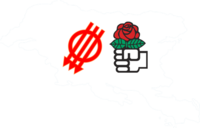Socialism in Gylias
| Socialism in Gylias |
|---|
 |
 |
|---|
| This article is part of a series on the politics and government of Gylias |
Socialism in Gylias has a long history, and has been a major political and social force alongside communism and anarchism.
Numerous variants of socialism exist in Gylias, some notably overlapping with communism and anarchism. The unifying current among them is broadly democratic and ethical. Defining characteristics include an advocacy of social ownership of the means of production, workers' self-management, and social protection. Notable divisions in the socialist movement include the role of markets, the feasibility of the state, and which means to use to achieve desired ends.
Socialism and social democracy are situated on the left of Gylian politics. At the federal level, it is primarily represented by the Socialist Party and Social Democratic Party as part of the Progressive Alliance. Other notable socialist or social democratic groups include the Left Liberal Rally in the Liberal Union, and the Free Land Party, Green Party, and Renewal and Justice Union among Non-inscrits.
Characteristics
Gylian socialism advocates creating a society and economy based on social ownership of the means of production and workers' self-management. Social ownership and self-management are viewed as vital to the achievement of economic democracy.
The utopian current has been a strong influence on the socialist vision of an ideal society: one based on a decent standard of living for all, the abolition of all forms of exploitation and inequality, and everyone's right to realise their talents and creativity. As with the broader Gylian left, socialists pursue decommodification as both a path to the ideal society and an end in itself.
Socialism supports direct democracy, extensive decentralisation, and the concentration of power at the most immediate practicable level. It is strongly libertarian on social issues, advocating free love, free thought, and economic, social, and cultural rights. It tends to be broadly secular and humanist, although it also has a notable spiritual current.
Both reformist and revolutionary currents exist within Gylian socialism, and have played a historical role in shaping its character.
Variants
Since the consolidation of electoral blocs at the federal level, parties that represent socialism and social democracy are spread among blocs, although with a concentration in the Progressive Alliance.
Generally, the Socialist Party emphasises democratic socialism and the Social Democratic Party social democracy, although both share a libertarian socialist orientation as a result of historical factors. Meanwhile, the Left Liberal Rally is a liberal socialist party in the Liberal Union, the Free Land Party is agrarian socialist, the Green Party is eco-socialist, and the Renewal and Justice Union was founded as an outlet for Gylias' spiritual left.
Market socialism
Market socialism in its Lange model variant forms the basic framework of the Gylian economy. The National Prices Board has sole price-setting responsibility, fulfilling the role of a central planning board.
Libertarian socialism
Libertarian socialism, also often called "anarcho-socialism", represents the anarchist branch of Gylian socialism. It advocates the abolition of the state and wage slavery in favour of decentralised direct democracy and workers' self-management.
Various schools of thought exist under the umbrella of libertarian socialism, based on differing perspectives on the usefulness of market systems, the primary locus of organisation, and the extent and methods of economic planning.
Social democracy
Social democracy emerged as a separate current largely as a result of the reform–revolution debate within socialism. Gylian social democracy is more pragmatically statist than the anarchist-leaning socialists, and advocates the ideal of the cooperative commonwealth.
Aristerokratia
Aristerokratia is a distinctive form of Gylian social democracy influenced by the Golden Revolution, with an undercurrent of lifestylism.
It advocates that the abolition of social class be coupled with the reappropriation and egalitarian transformation of class signifiers. Thus society would gain a group of citizens embodying ideals of cultivation, learning, and art, which would encourage fellow citizens to achieve their talents.
The term comes from a Hellene pun on aristocracy, replacing ᾰ̓́ʀῐςτος (áristos, "best") with ἀʀιςτεʀός (áristeros, "left"), implying "left aristocracy". It serves as an inclusive and egalitarian expression of other phenomena that combine bohemianism with an ideal of elegance, including the café society and jet set.
History
Ideas resembling socialism have a long history in Gylias, dating back to the Liúşai League. Historians characterise the rural communities of the League as agrarian socialist, and various leftist thinkers have claimed the League as a precedent for anarchism.
Xevden
Modern socialist thought began in the 19th century, particularly in response to the immiseration and discrimination of Xevdenite rule.

Mary Grant is generally considered the mother of Gylian socialism. She was a farm and mill owner who became famous for her philanthropy and concern for her workers. She paid them high wages, maintained good working conditions, provided education and healthcare to workers and their families, built parks and recreation areas, and introduced pioneering welfare schemes.
Mary's writings reflected her commitment to the ideal of a moral economy, and her focus on practical experience over theorising. Her advocacy of a humane and socialised economy that treated its workers with respect fit with the broader tradition of utopian socialism, and served as a forerunner to cooperativism.
The irony of the contrast between the well-off founder of socialism Mary Grant and the modest founder of conservatism Hannah Edelstein is famous in Gylian history. Ŋéida Vaşad argues that the ironic reversal of the founders' situations later informed the Gylian tendency to favour socialisation of goods that reflected class status rather than their rejection and abolition.
During this period, the terms "socialism", "social democracy", and "communism" were used interchangeably; they would later solidify into distinct ideologies.
King Karnaz's 1902 coup and subsequent repression caused socialists, anarchists, and other radicals to gain ground at the expense of conservatives and liberals in the ensuing disintegration.
Alscia
The Donatella Rossetti government governed the province of Alscia from its establishment to its dissolution. It was formed by the Popular Progressive Front, an alliance of liberal and left parties, thus marking the first time socialists and social democrats took part in formal governance.
Although the liberals dominated the government at first, their own adoption of Donatellism produced significant overlap with the left, and resulted in the passage of several socialist reforms. The model of state-driven development adopted by Donatella, similar to what would emerge in Kirisaki and Akashi, prioritised public control and influence over the private sector, and manifested in the creation of a mixed welfare state based on the principle of social insurance.
The alliance of the government, social movements, activist media, and investigative journalists produced a stream of legislation and regulation that improved working and social conditions. The cooperative sector grew rapidly. The Alscian economy achieved consolidation between a cooperative sector, a public sector, and a private sector controlled by the Gaulette conglomerate, whose founder Arlette Gaubert adhered to Mary's ideals of a humane economy.
Şio Etes was a significant intellectual contributor to socialism during the period. She reflects the mainstream of socialist thinking in Alscia, and sought to find compromises that would synthesise the different schools of thought and maintain unity. She supported reformism and the alliance with the cooperative movement, and was influenced by the prevailing social corporatism of the Donatellists, coming to advocate a form of guild socialism.
The experience of compromises necessary in government and the international context affected socialism in Alscia, heightening the contradictions in the movement. The SDP embraced reformism more readily than the SP, which was wary of a "dead end" and kept one foot outside, in popular agitation.
The Ruvelkan Socialist Republic, one of the first explicitly socialist states in Tyran, had a galvanising effect, eliciting both sympathy with its goals and criticism of its increasing bureaucratisation and authoritarianism.
The statist and authoritarian currents of the Alscian left lost ground to the anarchist and libertarian socialist ones in response to the Ruvelkan and Megelanese civil wars. The Communist Party of Alscia was also weakened by conflict between its authoritarian and libertarian factions, and many Ruvelkan anarchists moved to Alscia after the Ruvelkan Civil War.
The government's confrontational policy towards Xevden, manifested in the Alscian Border War and efforts to bolster the Gylian opposition in Xevden, had the side effect of increasing the exposure and popularity of socialism, communism, and anarchism, helping radicalise Alscia itself. Within the FPP, the SP and SDP gained influence in the 1920s–1930s at the expense of the liberals.
Free Territories
Anarchist principles formed the basis of the Free Territories, and within these the libertarian socialist and anarcho-communism predominated. The Free Territories' economic and social revolution served as the culmination of the radical Gylian currents that had gained strength through the ascendancy, Border War, and disintegration of Xevden.
The Free Territories' anarchist organisation opened space for experimentation and coexistence of multiple ideologies and economic systems. The most popular of these were leftist, based on workers' self-management and common ownership. The strength of the existing cooperative movement made cooperativisation a natural choice for socialising the economy, while anarcho-syndicalism was favoured to organise workers — producing the influential General Council of Workers' Unions and Associations and National Cooperative Confederation.
The Liberation War made intractable the conflict between anarchists–libertarians and statists–authoritarians. Although both sides formed a wartime "alliance of convenience", tensions remained strong as both struggled for hegemony over the Gylian left. The anarchists built up a popular front, joining forces with liberals and "constructive" conservatives to resist authoritarianism.
The conflict gained a notable cultural dimension: authoritarians were eager to simply destroy anything associated with Xevden in pursuit of a Year Zero, and tended to glorify "simple" farmers and workers. In response, anarchists embraced the utopian tradition passed down through Mary Grant, emphasising the reappropriation and socialisation of former status symbols, and favoured unity between the proletariat and intellectuals and artists. The ethos of the "right to satisfaction of one's needs" also served to distance anarchists from authoritarians' association with "bureaucratism, greyness, austerity, and dullness".
The "alliance of convenience" was finally broken by the Lucian Purge in 1956, which removed statists–authoritarians from public life.
Gylias
The end of the Liberation War put the left in a leading position at Gylian independence. The SP and SDP, joined by the anarcho-communist DCP, finished first in the 1958 federal election, collectively winning 46,4% of the vote and 146 Popular Assembly seats — five short of a majority by themselves.
Socialists took part in the popular drafting process that produced the Constitution and six codes of law. With the anarchists commanding plurality but not majority support, a "miserable compromise" resulted, with symbolic concessions won by liberals and "constructive" conservatives while the left focused on preserving the fundamentals of the Free Territories.
The 1960 electoral reform led to a proliferation of new parties. The Progressive Alliance was set up as the left's main electoral bloc, reuniting libertarian socialists and anarcho-communists. They were complemented by other socialist formations, including the Left Liberal Rally in the Liberal Union and the Free Land Party and Renewal and Justice Union among Non-inscrits.
The transition from the Free Territories to Gylias forged a Gylian consensus that included socialist tenets, and the National Obligation period saw the spread of the Free Territories' economic models throughout Gylias, as part of reforms that created a Lange model market socialist system.
Socialists and social democrats held several important posts in the Darnan Cyras government. Distinguished socialist ministers included Rin Tōsaka and Sakura Tōsaka, considered the "mothers of Gylian public education", Régine Walras, considered the "mother of the National Health System", and Theophania Argyris, the creator of the Hermes Programme. The social democrat ranks included two notable wartime figures: defense minister Ann Harman and sport minister Lilja Kjellberg.
The SP and SDP took somewhat junior roles to the DCP in the Progressive Alliance, reflected in their 1962 and 1969 federal election results, but established a solid constituency through alliances with the agrarian socialist FLP and demopolitan movement. Their utopian tradition accorded them a notable role in the social revolution aspect of the Golden Revolution.
Margot Fontaine made notable contributions to social democratic thought during this period. A ballerina, philosopher, and Senator under the "independent social democrat" label, she concerned herself with matters of identity, rejecting the nation-state and championing multicultural cosmopolitanism. Her ideal of l'pays jolie reflected the colourful identity and emphasis on social well-being that Gylian socialists had adopted during the war.
The concept of aristerokratia also took form during this period, advocated by Ser Şanorin and Sima Daián. They synthesised several strands that went into the socialised luxury ideal that emerged during the Golden Revolution, including Mary Grant's humanism, Hannaism, and foreign influences like the Jaerevik clique, to produce a form of social democracy that sought to couple the ideal of a classless society with preserving the ideal of elegance and refinement as an inspiration to others.
Ser and Sima's appealing personalities helped bring attention to aristerokratia as a quirky idea reflecting the experience of the Golden Revolution, and it found a niche together with similar eccentric presences like market anarchists and the LSD Party's acid communism. Notable manifestations included the Tessai in Maveás and the "Queens of Mişeyáke".
The wretched decade threw the PA into a long crisis. The parties' attempt to participate in the Aén Ďanez government specifically to obstruct the authoritarian left Revolutionary Rally caused disgust and tensions among its members, threatening to split the "popularist" and "pragmatist" factions.
The emergence of a strong environmentalist movement manifested in the growth of the eco-socialist Green Party, forcing other socialist parties to adapt their programs to environmental concerns.
Although Aén was ousted after the Ossorian war crisis of 1986 and the PA participated in the Filomena Pinheiro government, they and the other established blocs suffered a voter backlash for their delay, and were challenged by new formations. Voters turned instead to Non-inscrits, who obtained a breakthrough at the 1990 federal election.
Although officially out of government, Mathilde Vieira's "plural coalition" retained a few PA ministers, and it tended to reflexively lean left in political orientation. Aristerokratia went from an eccentric niche to a national impact through the Decleyre Summit and Social Partnership Program, which fostered a community of civic-minded and philanthropic rich Gylians, improving public attitudes towards entrepreneurship and wealth.
After a long period of finishing second to the LU, the PA once again won a plurality of first preference votes and seats in the 2012 federal election, and took the senior role in the Toni Vallas government.
Overview of Gylian socialism
|
Parties Allied parties and tendencies
|
Organisations
Media outlets
|


